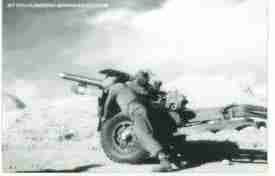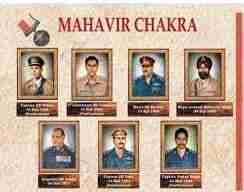A boy was born to a Bengali couple in small-town Meerut (Uttar Pradesh). The father was a teacher of English in a Post Graduate college in Meerut. It was a very happy and enlightened family. The boy was lovingly named Shyamal Dev Goswami.
He grew up as a dreamer; a thoughtful boy, fond of music and poetry, making interesting rhymes in rhythm. There was a shady Bakul (maulsari) tree in the garden. The family called it `Rabi-Bakul’ as it commemorated Rabindranath Tagore’s birthday. Little Shyamal used to park his tri-cycle under it and spend hours dreaming and playing with words. Sometimes, his sisters would also join him and he would tell tales of a Queen he had met in his thoughts. He would recreate a world of his own imagination. We all thought he would become a writer, poet or a creative artist.
He was just 21 years old, and his 22ndbirthday fell on 6th November. He wrote a letter from Chushul – the outpost he was commanding… There was not an iota of fear or foreboding in his letter.
He grew up. His mother inspired him to train to become an engineer after her own father and thus he took science for his future course – but his heart hankered after the Army. He was almost romantically attached to the idea of being a soldier like Netaji Subhash Chandra Bose. He was selected for an engineering course at a college in Gwalior (Madhya Pradesh), but he quietly appeared for the Services Selection Board (S.S.B.) for the Army after one year at the engineering course. He succeeded – thus began his glorious but, alas! shortlived period with forces. That shortlived period defined his life’s journey in a permanent way.
A new journey
He joined as an officer in the Artillery Division of the Indian Army, in the year 1962. But soon, in the same year, he was posted as an O.P. officer with 45 men to the front. The war with China had just begun.
The day that he received his order, he was in the Military Hospital suffering from fever and cold. He decided to leave hospital and report for work, which was not ordinarily possible. The stigma of war-fright, however, was to be vanquished. He left the hospital stealthily and got into a truck, full of soldiers leaving for the front. They reached the base camp. A `roll-call’ caught him out but he was spared a court-martial – the conditions of war were out of the ordinary. Perhaps hero-worship of Subhash Bose played on his mind and stopped him from excusing himself from the war.
As the shelling continued, and the small platoon he commanded was almost wiped out, Lt. Goswami himself was grievously wounded. But his last order to the supporting fire “Fire till Eternity” resonated through the frontier.
He was just 21 years old, and his 22ndbirthday fell on 6th November. He wrote a letter from Chushul – the outpost he was commanding. Chushul falls in the Leh District of Ladakh, and at an approximate height of 16,000 feet. There was not an iota of fear or foreboding in his letter. The Chinese attack on Chushul was on the 18th, and the ceasefire declared the next day, but those two days were enough for fate to take its toll.
The official Citation of the MahaVir Chakra awarded to Lt Goswami reads:
“2nd Lieutenant Shyamal Dev Goswamy was observation post officer on Gurung Hill, an important defensive position guarding the airfield at Chushul. On 18th November 1962, after a heavy barrage of artillery and mortar fire, the Chinese forces in overwhelming strength attacked this position. Despite heavy enemy pressure 2nd Lieutenant Goswami continued to perform his duties of directing artillery fire on the enemy.
He and the 4 Other Ranks of the observation post were under constant enemy fire. All 4 Other Ranks were killed and Lieutenant Goswamy himself seriously wounded, but he continued to perform his duty till he dropped unconscious. The enemy overran the position but left him apparently thinking he was dead. Later he was picked up and evacuated.
Throughout this action, 2nd Lieutenant Goswamy displayed conspicuous gallantry and devotion to duty in the finest traditions of our Army.”
Lt Goswami, a fearless soldier
The attack by the Chinese on Chushul outpost was overwhelming. Our side was hopelessly outnumbered. A kind of retreat was planned. The small platoon which was with Shyamal was to be withdrawn. He ordered most of them back, keeping only a handful of soldiers with himself to hold the fort at the outpost.

Along with others, he asked his own batman to leave, as he had only recently been married. The batman was a Sikh boy of tender age. The young man refused and said – “My station of duty is with you, Sir. I go where you go.” Shyamal insisted but the boy was adamant. Shyamal warned him about court-martial and the man was crestfallen.
When others had left, Shyamal heard the young man’s voice singing to a beat. He was singing a line from a Hindi film song “Dil deke dekho ji”; meaning “give your heart to win a heart in return”. The young man had not left with the others – just chosen to hide and be with Shyamal. Then the shelling started, and the boy was hit. He carried with him the few tears that his `Sir’ shed for him.
As the shelling continued, and the small platoon he commanded was almost wiped out, Lt. Goswami himself was grievously wounded. But his last order to the supporting fire “Fire till Eternity” resonated through the frontier. We are told that this order saved the outpost from the Chinese onslaught and a certain defeat.
A mother’s belief
Here I am tempted to narrate an interesting but heart-rending incident. When our mother was told about his posting at the front, she was naturally very upset. She called our family astrologer and prayed for some spiritual safeguard for the young Shyamal. The astrologer assured her his well-being by doing a special “Puja” (offering) of “Mahamrityunjay Mantra”.
When the message came from the Army H.Q. “Your son, Lt. S.D.Goswami killed in action”, the whole family was devastated, except our mother, who remained steadfast. She neither shed a tear nor lamented. She kept on repeating “He is not dead – the astrologer has said he will suffer, but he will not die. He is Alive – just Pray for his life and wait.” She entered her “Puja Room” and prayed all through. We were all huddled together; in our agony of loss.

The third day after the first message from the Army H.Q., there was a knock at our door at about 9 pm. It was a messenger from the Indian Army. At first, the message he carried did not register. It was worded somewhat like this “Your son, believed killed in action, has reached Army Hospital, Delhi Cantonment. Come immediately.” It then dawned on us “He is Alive!”. That’s when our mother said, “please, all of you dress nicely – because he likes to see you all finely dressed.”
Early next day, at about 5 am, we started from Meerut for Delhi – a journey of about 40 miles. We were taken to see him in the Military Hospital. He was covered from head to foot in a canopy of bandages – his forehead alone peeping out a little. We recognized him! Seeing us all with our mother, he said: “Ma, I am here.” That was the moment Ma shed tears – incessantly.
Fighting on
We were told that he had frostbite on his toes and feet. He had sustained a shell wound on his face, endangering his left eye. The fingers of the right hand had also suffered serious frostbite. There were many other wounds – none as dangerous. With the wishes of all, the long struggle between his destiny and medical efforts began. The frostbite claimed his legs and fingers of his right hand.
With both legs amputated below the knees, and four fingers of the right hand gone, he was left with his right thumb – to show it to fate! He joked about it. Self-pity could not settle anywhere near him. The fingers of the left hand were intact, as he was wearing his left glove on the fateful day.
With both legs amputated below the knees, and four fingers of the right hand gone, he was left with his right thumb – to show it to fate! He joked about it. Self-pity could not settle anywhere near him.
We asked him why he had taken off the right glove. He told us that the shell wound to his face had been very painful and he was bleeding profusely at the time – and for a moment he had thought of killing himself. He took off the right glove to use his revolver, but it was almost struck off from his hand and thrown at a distance that he could not reach. We were all reminded of our mother’s conviction.
Then, there was a long road to rehabilitation. Initially, the Government of India could not find the funds for his treatment, due to the extreme cash crunch situation it was in. God intervened. The Rotary Club of India along with other Rotarians across the globe took up his cause. He was sent to Germany for medical treatment and rehabilitation. He stayed in Germany for five years and came back walking on artificial legs.
But stand tall he did; he received his `Mahavir Chakra’ (MVC) from the President of India standing on his own legs.


